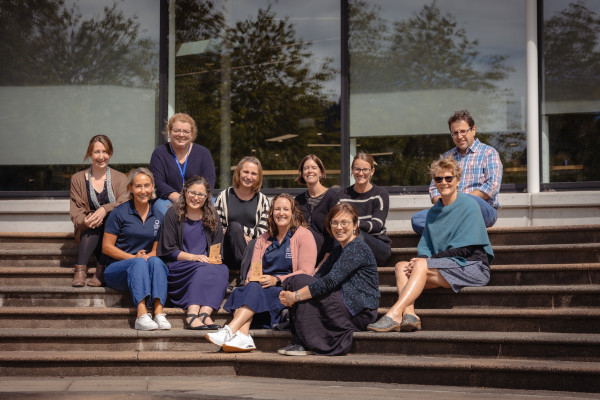- Tūhono home Hoki ki Tūhono
-
- Staff Directory
- Chief Executive Office Auckland International Office Corporate Services Finance Campus Services Functions and Catering Information Systems and Support Marketing, Communications and Engagement Learner Journey Academic Registry International Learner Services Te Punaka Ōwheo
- Learner Experience Academic Excellence Central Campus College of Community Development and Personal Wellbeing College of Engineering, Construction and Living Sciences College of Health College of Work Based Learning Open Education Resource/OERu Research and Postgraduate Studies Te Maru Pumanawa | College of Creative Practice and Enterprise
- Māori Development and Kaitohutohu Office People, Culture & Safety People and Culture Childcare Centre Te Ama Ako | Learning and Teaching Development Wellbeing and Safety Auckland Staff Directory Executive Office Academic Corporate Services Marketing and Business Development Human Resources Campus Quality and Programme Development
-
 Our people make a better world
Our people make a better world
We build the capabilities of individuals, organisations and communities and help them to realise their potential.
Staff Directory
-
- Tools
- Academic Integrity Declaration Form AIC Applications Dashboard Approved Programmes Approved Programme Fees Centralised Assessement Repository Chemwatch CMS - Tūhono & StudentHub updates Course Evaluation and Surveys CRM Applications CRM customer service hub Delegations policy/process Disability and Neurodiversity Dynamics 365 (CRM) EBS Ontrack EBS Report Email Security Personal Portal Employment Matters / Solarworkplace / Performance Reviews eTaxi eTV
- Financial Variance Reporting Hidden Disabilities Sunflower programme FCM travel intranet InPlace International entry requirements Knowledgebase articles Learner Capability Learner Support Dashboards Linkedin Learning Log a job with Marketing Login as an applicant Microsoft 365 Moderation App Moodle OP Docs OP Docs - Publishing OP Image Libraries Performance Excellence Portal Product Evaluation Panel
- Policy Library Privacy Programme and Course Design and Development Qualtrics XM RDS Remote Access Support Portal Research Database Robertson Library Staff FAQs about Graduation Status of Programmes Student Hub (Kāpehu demonstration view) Study Abroad info for learners Tūhauora I Wellbeing resources Uniprint Vault Webexpenses Auckland Tools
-
 Vault
Had an accident or near miss?
Log it here
Vault
Had an accident or near miss?
Log it here
-
- Communities
- Community AI Steering Committee Ally Network EBS Community of Interest EdTech Champions Health & Wellbeing Research Internal Evaluation Neurodiversity Professional Team Professoriate Proud@OP Student Support Website Advisory Group Web Champions Working under the Rainbow Project Learner Capability Trade Training Centre
- Committee Academic Committee Animals@OP Diversity and Equity Doctor of Professional Practice Committee Kaunihera Whakahaere - Leadership Council Internal Evaluation Learning & Teaching Leadership Team Library Committee Mental Health and Wellbeing Advisory Group Otago Polytechnic Board of Directors Pastoral Care Code Committee Programme Approvals Committee Research and Postgraduate Committee Research Ethics Committee Staff Subcommittee
- Think Tanks Mātauraka Our learners achieve educational success Pūtea Our financial success Tākata Our people, our team, our community Tiriti Our active commitment as a Treaty partner Tūroa Our commitment to be a sustainable and responsive organisation
-
 Create a community
Create a community
Do you have a community, committee or project that you'd like represented here?
Communities
-
- About OP
- Keep up to date All news All events All notices All blogs Share your info Create a news article Create an event Create a notice Create a blog
- Community and Partnerships Alumni and friends Education Foundation Operational information Academic calendar 2025 Academic calendar 2026 Current vacancies Dunedin campus map Our policies Topical FAQs
- Who we are Commemorative sites Māori Strategic Framework Our history Our strategic priorities Pasifika Strategic Framework (2025-2030) Vision and Values Working for us OP job opportunities Wellbeing Calendar Working at OP
-
New Zealand: 0800 762 786
contact us
International: +64 3 477 3014
The evolution of an identity activist: An indigenous autoethnographic journey
Author: Mawera Karetai
Supervisors: Martin Andrew Samuel Mann
The evolution of an identity activist: An indigenous autoethnographic journey
Mawera Karetai
3 November 2021
Karetai, M. (2021). The evolution of an identity activist: An indigenous autoethnographic journey. (A thesis submitted for the degree of Doctor of Professional Practice, Otago Polytechnic).
Abstract
This thesis is a critical reflective journey. It is indigenous autoethnography. It details the evolution of a social justice advocate, transforming into an identity activist, and the development of new ways of practicing in complex social spaces. The work takes the concept of unconditional positive regard out of psychology and introduces it as a foundation for professional practice across broad practice areas. There is a crimson thread that runs through this thesis - unconditional positive regard. My self-empowerment as a practice researcher manifests itself in this eclectic kaupapa Māori bricolage.
Humanist psychologist Carl Rogers believed that “each individual has within him- or her-self vast resources for self-understanding, for altering her or his self-concept, attitudes, and self-directed behaviour” (Rogers C. R., 1980, pp. 115-116). Rogers believed in self-determination and in our ability to make changes in our lives if we are empowered to do so by approaching relationships with what he called “Unconditional Positive Regard”. Rogers’ will become the foundation for a model of professional practice used to overcome personal and social barriers, and to empower person/problem-centred change from an individual through to a societal level.
The methodologies used to present this professional practice thesis are an eclectic mix of traditional and non-traditional methodologies, resulting a unique bricolage that makes use of the tools available to build something new. Underpinning the methodological mix is kaupapa Māori as a research methodology, not because of any added value, but because of the way the writer, as an indigenous woman, naturally views the world. The indigenous bricolage methodology will be expanded on in Chapter Two.
Exploring and applying unconditional positive regard in an activism context, using a combination of real life, and fictionalised narrative to demonstrate the issues faced in some Aotearoa communities has resulted in the creation of two new models of practice. The Kohioawa Impact Model enables a practitioner to map the impact in their practice area/s, and map where they could be creating barriers in their practice. The Identity Activism Model is a pathway that maps a practitioner/subject relationship, to ensure that the practitioner is positioned in unconditional positive regard towards those they work with.
Each of the two models described works independently of the other but used together they create a very strong tool for self-awareness and maintaining person/problem-centred position in personal and professional relationships.
From the shoulders of giants, the development of the two new models adds to the existing work of others who have paved the way in activism and person-centred practice, to create new problem-solving tools for the practitioner toolbox.
Keywords: dysconsciousness, dignity, relationships, power, self-actualisation, mana, identity, activism, change, bricolage, kaupapa Māori
Mawera Karetai's thesis was supervised by Martin Andrew and Samuel Mann.
Licence
This thesis is not publicly available. The abstract is available under a Creative Commons Attribution Non-Commercial No Derivatives licence CC BY-NC-ND 4.0 International.
